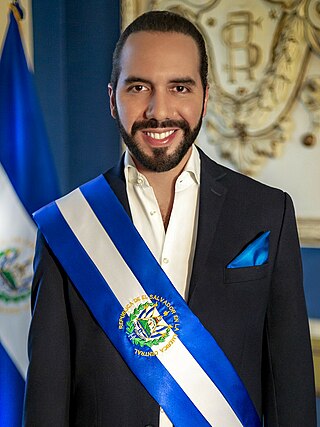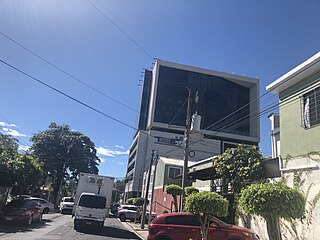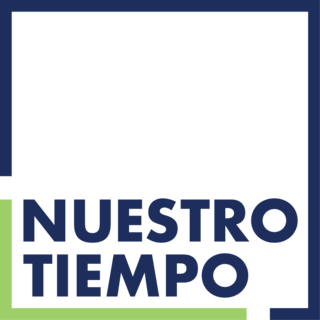
Politics of El Salvador takes place in a framework of a presidential representative democratic republic, whereby the President of El Salvador is both head of state and head of government, and of an executive power is exercised by the government. Legislative power is vested in both the government and the Legislative Assembly. The Judiciary is independent of the executive and the legislature. The Economist Intelligence Unit rated El Salvador a "hybrid regime" in 2022.

The Farabundo Martí National Liberation Front is a Salvadoran political party and former guerrilla rebel group.

The government of El Salvador is a presidential representative democratic republic.

The National Coalition Party is a nationalist political party in El Salvador. Until 2011 it was known as the National Conciliation Party. It was the most powerful political party in the country during the 1960s and 1970s, and was closely associated with the Salvadoran military. Julio Adalberto Rivera Carballo, a candidate of the National Conciliation Party, was elected president in 1962, and the next three presidents were also from the party. After the 1979 coup the party declined in influence but continued to exist.

The Christian Democratic Party is a Salvadoran political party. From 2011 to 2012, the party was renamed to Party of Hope before reverting to the Christian Democratic Party. The PDC has been led by Reinaldo Carballo since 2023.

The municipalities or municipios of El Salvador correspond to the second level administrative division in the Republic of El Salvador which divide its departments. El Salvador contains 262 municipalities.

The Plurinational Electoral Organ is the independent electoral branch of the government of Bolivia. It replaced the National Electoral Court in 2010.

Legislative and local elections were held in El Salvador on 11 March 2012 to choose 84 members of the legislative assembly and 262 mayors. The election was carried out by the Supreme Electoral Tribunal. The opposition Nationalist Republican Alliance (ARENA) narrowly defeated the Farabundo Martí National Liberation Front (FMLN) and its ally Grand Alliance for National Unity (GANA).

Nayib Armando Bukele Ortez is a Salvadoran politician and businessman who is the 43rd president of El Salvador, serving since 1 June 2019. He is the first president since José Napoleón Duarte (1984–1989) not to have been elected as the candidate of one of the country's two major political parties: the left-wing Farabundo Martí National Liberation Front (FMLN) and the right-wing Nationalist Republican Alliance (ARENA).

The 2006 Costa Rica local elections were held on December 3, 2006. In the February 2006 general elections, Costa Rica elected president, vice-presidents, deputies of the Legislative Assembly and municipal councilors in the general elections. The December 2006 elections were held to elect cantonal mayors, members of the District Councils of each of the nation’s districts and intendants of eight special autonomous districts and islands.

Legislative elections were held in El Salvador on 4 March 2018 to choose 84 members of the Legislative Assembly and 262 mayors. The elections were carried out by the Supreme Electoral Tribunal.

Presidential elections were held in El Salvador on 3 February 2019, with Salvadorans electing the president and vice president for a five-year term from 2019 to 2024.

Legislative elections were held in El Salvador on 18 February 2021. Salvadorans elected all 84 deputies of the Legislative Assembly, all 262 mayors of municipal councils of the country's municipalities, and all 20 of El Salvador's deputies to the Central American Parliament (PARLACEN).

Nuevas Ideas is a Salvadoran political party. The party was founded on 25 October 2017 by Nayib Bukele, the then-mayor of San Salvador, and was registered by the Supreme Electoral Court on 21 August 2018. The party's current president is Xavier Zablah Bukele, a cousin of Bukele who has served since March 2020.

The Supreme Electoral Court is the highest electoral authority in the country of El Salvador.

Ernesto Alfredo Castro Aldana is a Salvadoran politician and businessman who currently serves as the president of the Legislative Assembly of El Salvador. Castro previously served as a secretary and private advisor to Nayib Bukele from 2012 to 2020 when he was elected as a deputy of the Legislative Assembly from San Salvador in the 2021 legislative election.

Nuestro Tiempo is a Salvadoran political party. The party was founded in 2019 and it is currently led by Andy Failer.
General elections will be held in El Salvador on 4 February 2024 to elect the president, vice president and all 60 deputies of the Legislative Assembly. This will be followed by a second set of elections on 3 March 2024 in which voters will elect all 44 mayors and municipal councils of the country's municipalities and all 20 of El Salvador's deputies to the Central American Parliament (PARLACEN). If necessary, a second presidential round will be held on the same date if no candidate receives over 50 percent of the vote in the first round.

Juan Manuel de Jesús Flores Cornejo, nicknamed "El Chino", is a Salvadoran politician. As a member of the Farabundo Martí National Liberation Front (FMLN), Flores served as the mayor of Quezaltepeque from 2003 to 2012 and then later as a deputy of the Legislative Assembly from La Libertad from 2012 to 2021. He is currently a presidential pre-candidate for the FMLN for the upcoming 2024 general election; his running mate is Werner Marroquín. Flores supports El Salvador further strengthening relations with the People's Republic of China.



















